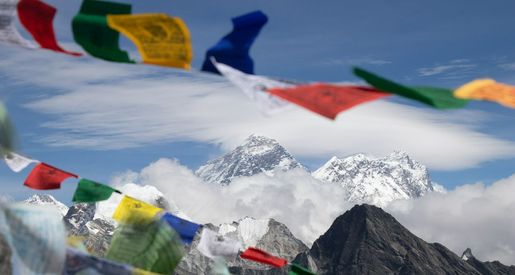- Details
- Category: Knowledge Centre
Training Information for an Everest Base Camp Trek
Here is some training information for your Everest Base Camp Trek.
Get the body prepared
Although this trek is very accessible and doable for most people with no previous technical experience, the trek to EBC should not be underestimated. The trek is a serious challenge and you need to put plans in place to get yourself prepared for the challenge. If you put plans in place, have a super positive attitude to training then you stand a huge chance of successfully and safely reaching Mt Everest and most of all having one of the most memorable and spectacular adventures in the world.
Get out into the mountains
As mentioned, the trek to Everest Base Camp is a tough and physical challenge but is well within the reach of most people who enjoy a reasonable level of fitness. However, any training that you want to do as part of your trip preparation needs to include or simulate part of the challenges posed by hiking at altitude and the rigours of mountain walking. We recommend starting your training as soon as you can before your trek but definitely 8 weeks or more before the actual trek. Normal training routines that build strength, fitness, and stamina, such as aerobic exercise and light weights can be beneficial, particularly if you don’t count yourself to be fit. However, the best physical preparation are activities which put your body under the same stresses that happen when you ascend or descend on the trek to Everest Base Camp. Hiking up and down hills or mountains is THE best way to train for this trek. You are strongly advised to seek medical advice before deciding to arrange your trek and before starting a training program, particularly if you have any concerns about your health
Make a plan
If you’re thinking of going on an Everest trek then we can help you put together a plan to get in shape for the trek. We have a lot of experience in getting prepared for high altitude trekking and we always make walking or hiking as the NUMBER ONE part of your physical training. If you’re a regular mountain walker and used to full days on the mountain then you’re at a good standard. Try challenging yourself to carry a weighted pack for the duration of the hike or even try consecutive days hiking to push your legs and body. If you are only just getting into walking then try some local walks up and down if possible. Each time make the walk longer and longer until you are walking 4-6 hours in one day.
When you go hiking remember to wear the same walking boots you are going to wear on the trek itself. Getting used to your footwear is so important and it’s one less thing to think about when at high altitude.
When you’re training for a trek, having mental strength is key. Being mentally prepared for the rigours of high altitude trekking is crucial to your chances of a successful trek. A positive attitude helps you deal with the strains on your body and lack of oxygen at higher altitude can sometimes make people a little grouchy. So do be prepared for some setbacks and parts of your trek that might be physically difficult. And remember that your guide will be there to encourage and inspire you!
3 things to make your training work
#1 It’s super important to make sure you have enough time to prepare for a trek. In terms of physical training, it’s no good to try and squeeze everything into a couple of weeks before you leave. Make sure you build your fitness level or a longer period of time and you will soon find out how strong you are at altitude. It also keeps those niggling little injuries at bay. Check out our Top 10 tips for a trek to Everest Base Camp
#2 Eat Well! If your body is in good nutritional shape before a trek, it gives your body the best chance at dealing with the high altitude. Having a well-balanced diet to maintain a good level of health gives you more energy which is super key on a trek. As your training regime increases and you go on longer hikes or more intense gym sessions, more strain will be placed on your carbohydrate fat stores. Before, during and after exercise you will need to supply your body with the fuel it needs!
#3 Chill Out! In the build-up to the trip try and chill out a little before you depart. Slow your training right down, and get some well earned rest as your body needs to be in good condition. You can still head out for some walks but don’t put your body under too much strain. When you’re on a trek, knowing your body is in good shape, gives you one less thing to worry about, it boosts your confidence allowing you to get the most out of the experience in the mountains.
Speed is key
When we hike towards Everest Base Camp, we cover the daily distances as slowly as possible, you should be the last person into the village. We don’t want to overexert your body and want to you enjoy the surroundings. Take it all in, relax, enjoy a super slow pace and this will massively aid your body to adjust to the lack of oxygen. THIS IS THE NUMBER ONE RULE! SLOW DOWN! Keeping well hydrated, drinking 4 to 5 liters of water each day is also critical to success. A litre before you start hiking, 3 litres whilst hiking and 1 in the evening will be just fine.
Don’t take the trek lightly
The trek to Everest Base Camp is one heck of a challenge, and should not be taken lightly. Having made the journey myself you realise how important it is to put things in place to manage your body at high altitude. It’s why we build 2 days acclimatisation into all of our treks. One at 3,300m/10,800ft and another at 4300m/14,400ft. EverTrek treks spend 2 nights in Namche Bazaar and 2 nights in Dingboche, this will give you a more enjoyable and safer journey to Everest Base Camp. This is vital if you want to be successful on your Everest Base Camp Trek.
Once you sign up on one of our treks, we are available to help you prepare and train and have all the information you need for you to have a great trip. We will send you our Everest Base Camp guide which includes information on our quality treks to EBC.
If you hike in the hills or mountains 2 or 3 times a month, you should have the conditioning needed for the Trek. It is vital to be out hiking and walking in your trekking boots and make sure this is 4-6 months in advance of your trip. As we mentioned, you also need to add in 3 to 5 days week in the gym especially if you do not have access to hills or mountains.
We hope you found this Training Information for an Everest Base Camp Trek useful. If you want to chat with us and discuss the trek then just give us a call or email us and we can help get you ready for your trek.
CALL US or EMAIL US for more information
Previous Articles
- How to Train for the Everest Base Camp Trek
- How high is Everest Base Camp?
- How much spending money do you need for the Everest Base Camp trek
- What's the accommodation like on an Everest Base Camp trek
- Are showers available on the Everest Base Camp trek?
- What type of toilets are available on an Everest Base Camp Trek






